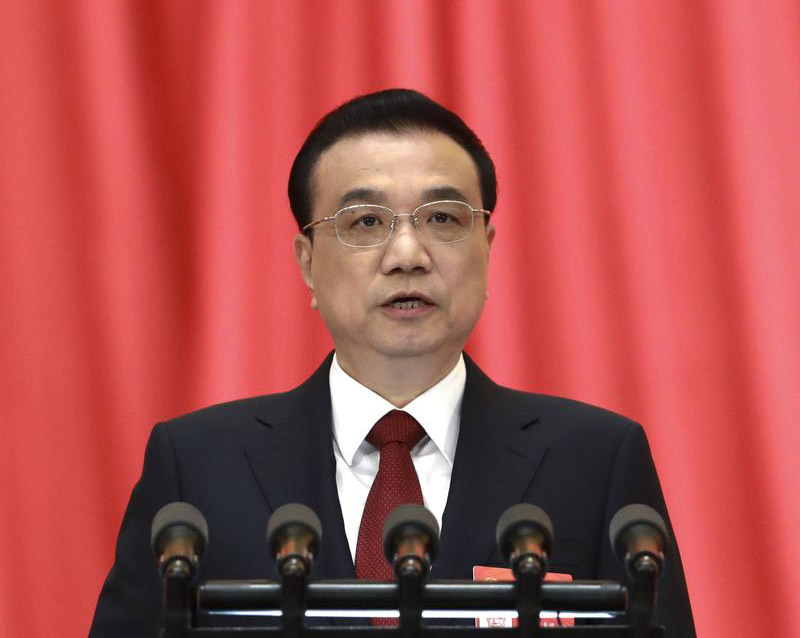
- The Washington Post reports, "The setting for the Chinese Communist Party's annual confabs this year, when the party will celebrate the 70th anniversary of the foundation of the People's Republic, could hardly have been more inauspicious. The economy is slowing palpably. A trade war with the United States is rumbling on. And there are persistent whispers about President Xi Jinping's handling of both. Even the air was a foul-tasting soup of gray as the National People's Congress opened Tuesday. 'Looking out the next 12 months, Beijing sees the possibility of a significant deterioration in the economy,' said Jude Blanchette, head of the China practice at the Crumpton Group, a business intelligence firm. 'There's an increasing consensus in the private sector that Xi is mismanaging the economy, which has sparked an uptick in discontent over his leadership.' But the party tried to put a positive spin on China's outlook while acknowledging the realities when the annual parliamentary meeting opened Tuesday."
The Wall Street Journal reports, "'Made in China 2025,' a government-led industrial program at the center of the contentious U.S.-China trade dispute, is officially gone -- but in name only. During a nearly 100-minute speech to China's legislature Tuesday, Premier Li Keqiang dropped any reference to the plan that the Trump administration has criticized as a subsidy-stuffed program to make China a global technology leader at the expense of the U.S. The policy had been a highlight of Mr. Li's State-of-the-Nation-like address for three years running. Instead, Mr. Li said the government would promote advanced manufacturing. He ticked off a list of emerging industries to nurture -- next-generation information technology, high-end equipment, biomedicine and new-energy automobiles -- that were also in 'Made in China 2025' and with a similar goal: 'Buy China.' The government would 'work faster to make China strong in manufacturing,' Mr. Li told the roughly 3,000 delegates inside the Great Hall of the People. Beijing, he said, would 'encourage more domestic and foreign users to choose Chinese goods and services.'"
- The Wall Street Journal reports, "Chinese hackers have targeted more than two dozen universities in the U.S. and around the globe as part of an elaborate scheme to steal research about maritime technology being developed for military use, according to cybersecurity experts and current and former U.S. officials. The University of Hawaii, the University of Washington and Massachusetts Institute of Technology are among at least 27 universities in the U.S., Canada and Southeast Asia that Beijing has targeted, according to iDefense, a cybersecurity intelligence unit of Accenture Security. The research, to be published this week, is the latest indication that Chinese cyberattacks to steal U.S. military and economic secrets are on the rise. The findings, reviewed by The Wall Street Journal, name a substantial list of university targets for the first time, reflecting the breadth and nature of the ongoing cyber campaign that iDefense said dates to at least April 2017."
- 2019-03-04 Huawei CFO is suing Canada over December arrest
- 2019-03-03 Huawei CFO suing Canada over December arrest
- 2019-03-01 Pompeo says North Korea not clear on scope of closing Yongbyon facility
- 2019-02-28 Trump says China has been 'a big help' in US dealings with North Korea
- 2019-02-27 Trump Undermines Top Trade Adviser as He Pushes for China Deal
- 2019-02-26 Chinese stocks rocketed higher on Trump's trade tweet, but a deal isn't a sure thing
- 2019-02-25 Trump Delays a Tariff Deadline, Citing Progress in China Trade Talks
- 2019-02-24 Trump Delays a Tariff Deadline, Citing Progress in China Trade Talks
- 2019-02-22 Saudi Arabia strikes $10 billion China deal, talks de-radicalisation with Xi
- 2019-02-21 U.S., China sketch outlines of deal to end trade war - sources
- The Washington Post China's Communist Party is battening down the hatches as the economy slows
- The Wall Street Journal Beijing Drops Contentious 'Made in China 2025' Slogan, But Policy Remains
- The Wall Street Journal Chinese Hackers Target Universities in Pursuit of Maritime Military Secrets
- Bloomberg China Defense Spending Set to Rise 7.5% as Xi Builds Up Military
- The Washington Post Huawei opens Brussels security lab in bid to reassure EU
- CNBC Chinese premier: 'We must be fully prepared for a tough struggle'
- Bloomberg China Announces Plan to Form National Oil & Gas Pipeline Company
- The New York Times Philippine Official, Fearing War With China, Seeks Review of U.S. Treaty
- Reuters China says Canadian stole secrets; Huawei to sue U.S.
- Fortune U.S., China Are Close to a Trade Deal—but the Trade War Could Continue
- Reuters China says can 'absolutely' reach deal with U.S. on financial opening
- Seattle Times Experts: US anti-Huawei campaign likely exaggerated
- Reuters Stocks stall but dollar strengthens as China cuts growth target
- LA Times Trump's trade war is politically motivated, yet hurts consumers and GOP voters, study shows
- Reuters China services growth eases to four-month low in further blow to economy
- The Washington Post KFC dedicates China restaurant to memory of Communist hero
- Bloomberg DJ Don Diablo China Push Shows Challenge Facing Music Labels
- Bloomberg China Has a Dirty $1 Trillion Stimulus Secret
- Forbes Despite Trade War, U.S. Companies Still Love China (Sort Of)
- The Wall Street Journal Behind China's Desire for a Trade Deal With Trump
- The New York Times America the Cowardly Bully
- Financial Times Is Huawei compelled by Chinese law to help with espionage?
- Foreign Policy Kazakhs Won't Be Silenced on China's Internment Camps
- National Interest What the Latest Opinion Polls Say About Taiwan
